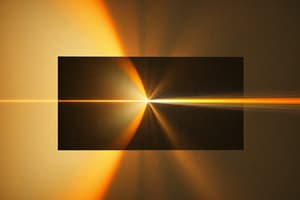Podcast
Questions and Answers
What makes doped aluminum oxide ideal for various applications?
What makes doped aluminum oxide ideal for various applications?
- High reflectivity across ultraviolet to near-infrared spectrum ranges (correct)
- Low reflectivity only in ultraviolet spectrum
- Low durability but high reflectivity
- High reflectivity in visible light spectrum only
What type of mirrors employ thin layers of reflective material on polished aluminum substrates?
What type of mirrors employ thin layers of reflective material on polished aluminum substrates?
- Aluminum mirrors (correct)
- Steel mirrors
- Copper mirrors
- Plastic mirrors
What does the text imply about the reflectance of aluminum mirrors?
What does the text imply about the reflectance of aluminum mirrors?
- It is easily scratched and damaged
- It is high and durable (correct)
- It is similar to regular glass mirrors
- It is low and costly
Why are aluminum mirrors suitable choices for scientific endeavors?
Why are aluminum mirrors suitable choices for scientific endeavors?
How does the text suggest we can better understand the world around us?
How does the text suggest we can better understand the world around us?
What is dispersion in the context of light?
What is dispersion in the context of light?
What causes white light to split into colors when passing through media like a glass prism?
What causes white light to split into colors when passing through media like a glass prism?
Which factors influence dispersion?
Which factors influence dispersion?
How do highly dispersive optical materials like crown glasses affect lenses?
How do highly dispersive optical materials like crown glasses affect lenses?
What role does aluminum play in optics?
What role does aluminum play in optics?
What are achromats designed to counteract?
What are achromats designed to counteract?
Flashcards are hidden until you start studying
Study Notes
Light: Unraveling Its Secrets through Dispersion and Aluminum
Light, arguably one of our most cherished yet elusive discoveries, has permeated society since its first glimpses through ancient shadows dancing against cave walls. Today we delve into two fascinating aspects of this ephemeral marvel—dispersion and aluminum's role within it.
Dispersion: This refers to the phenomenon where light rays traveling through different materials alter their speed and direction based upon their wavelength or color. These variations cause white light to split apart into colors when passing through certain media such as prisms or raindrops. As a simple thought experiment, consider sunlight entering a glass prism; the prism bends each colored portion differently due to varying refractive indices — blue being bent more than red because blue travels slower inside the glass.
Dispersion is dependent upon three factors: the medium's refractive index, its thickness, and the angle of incidence. Highly dispersive optical materials like crown glasses contain various combinations of elements that enhance chromatic aberrations in lenses. However, these properties have also led scientists to develop specialized elements like achromats which counteract such distortions by combining two components with differing dispersive strengths.
Aluminum: Although relatively transparent in its purest form, aluminum plays pivotal roles within optics via alloys and coatings. For instance, doped aluminum oxide boasts low reflectivity across ultraviolet to near-infrared spectrum ranges, making it ideal for use in various applications—from anti-reflective coating to photoelectric cells and semiconductors. Additionally, aluminum mirrors, employing thin layers of reflective material (such as silver) deposited onto polished aluminum substrates, exhibit high reflectance and durability while maintaining cost efficiency. These attributes make them suitable choices for scientific and commercial endeavors ranging from telescopes and laser systems to solar energy conversion equipment.
In summary, light, although seemingly ubiquitous, remains a complex entity whose intricacies continue to fascinate and inspire humankind. By exploring dispersion and aluminum's contributions, we can better understand how they shape the world around us—from the kaleidoscope hues produced by natural phenomena to technological advancements accelerating human progression.
Studying That Suits You
Use AI to generate personalized quizzes and flashcards to suit your learning preferences.




